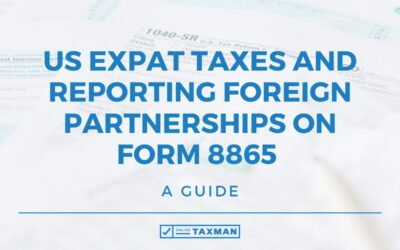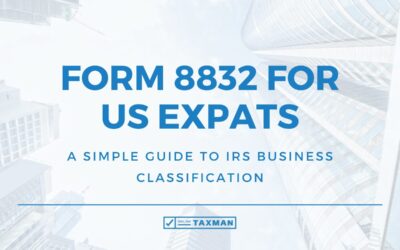It’s easy to forget, with so much else going on this year, but it is tax time!
Don’t wait until the last minute for filing your expat taxes in 2025. If you will owe US tax, you must pay it by April 15, while Americans living abroad have until June 16 (as June 15 is a Sunday) to file in 2025. Don’t forget that experience expat tax accountants will be busy leading up to these deadlines.
To help you prepare, let’s cover the expat tax basics. After that, we have 5 easy tips to get you started.
Even if you don’t plan to file your tax return by April 15 you should prepare as soon as possible to avoid paying interest and to leverage some potential benefits. (If this is your first tax season as an American abroad, you might also want to check our 11 Expat Tax Tips Before Moving Abroad.
Expats have to file a US tax return even if they don’t owe any tax
First of all, it is necessary to file your taxes each year. This may seem obvious but many US expats fail to report. If your total income is above the following thresholds, you are indeed required to file a tax return.
Income thresholds (2024 tax year):
- Single: $14,600 if under age 65; $16,550 if age 65 or older
- Married filing jointly: $29,200 if both spouses under age 65; $30,750 if one spouse under age 65 and one age 65 or older; $32,300 if both spouses are 65 or older
- Married filing separately: $5 for all ages if the spouse files a separate return and itemizes deductions
- Head of household: $21,900 if under age 65; $23,850 if age 65 or older
- Qualifying widow(er) with dependent child: $29,200 if under age 65; $31,150 if age 65 or older
- Self-employed: net self-employment income of $400 or more.
In addition, there are other situations when you need to file a tax return, for example when you have unearned (passive) income above certain thresholds.
A common misconception among Americans abroad is that if they earn less than about $126,500, they qualify for the Foreign Earned Income Exclusion (FEIE) and don’t have to file. This is false. You can only claim the FEIE if you actually file a return.
If you haven’t filed in the past, maybe because you weren’t aware of the requirement, you should catch up on back taxes. The IRS has programs in place for getting back into compliance. Talk to an experienced expat tax CPA about the best strategy.
Doing taxes yourself vs using a tax accountant when living abroad
US taxes can get very complex for Americans living outside the US.
You could use DIY software like TurboTax in simple cases if you are willing to do research on expat tax topics and dive into the actual tax forms.
The guiding question approach of those programs focuses on domestic filers and doesn’t provide deep guidance for expatriates. Some typical expat scenarios are called “this is uncommon” in the DIY tax software and are easily overlooked by inexperienced tax filers.
To make sure you don’t miss out on any expat-specific deductions and to ensure that everything is done correctly, use an experienced US tax accountant. Even most US-based CPAs are not familiar with the regulations around expat-specific provisions of the tax law.
How to get ready for preparing your US taxes when living abroad
Your last year’s return is always a good starting point for preparing for the new filing. If you start working with a new accountant, he or she should want to review your prior year returns to be aware of any carryovers or other assessments.
For the preparation of your tax return, you need documentation about your income and any applicable deductions and exclusions. You can find general checklists for US taxes on many websites. Here we focus on specifics for expats.
1. Earned income – Salary, wages, freelance income
If you are employed at a US company, you should’ve received a W-2 from your employer.
As an independent contractor or freelancer, you would get a Form 1099-MISC instead of a W-2. In addition, when being self-employed you must keep track of all income, even if it is not reported on a 1099-MISC and even if it is from a foreign source.
Employers outside the US usually don’t issue a W-2 or 1099. In that case, you need a document that shows your income and any taxes paid in your host country. Most companies are able to give you a local tax document equivalent to a W-2 or a year-end summary with the income and tax information. Otherwise, you can use your own spreadsheet to track your foreign income and foreign tax paid if any.
2. Passive income – Investment and other non-earned income
Stock and securities transactions – For any stock or security that you bought or sold in the tax year, you have to record the capital gain or loss. US brokerages provide a year-end statement and form 1099-B.
Foreign financial institutions may not issue a similar statement, so it becomes your responsibility to document all reportable transactions, e.g. using periodic or monthly statements. Keep in mind that you have to report even those foreign transactions that may not be taxable in a foreign country but are in the US.
Interest and Dividends – If you are receiving interest or dividends from US investments you should receive a Form 1099-INT or 1099-DIV. For non-US investments, you can use monthly or year-end statements. If those are not available you may have to ask your bank to compute the total interest and dividend income for the tax year for you. Again, even if those foreign interests and dividends are tax-free in that country, you still must report those on your US tax return.
Social Security and pension income – For US Social Security payments you receive from SSA 1099. Other US pension and retirement income is reported with Form 1099-Ret. Payments from foreign social securities and pensions, however, may not have similar year-end statements, so you need to keep track of the payments using your bank accounts or other statements.
Rental income – If you have any rental property, no matter where in the world, or you rent out your own home, you must report the income. Most vacation rental platforms will supply a year-end report if you make over a certain threshold. If not you will have to put together the numbers yourself. Remember to also record all related expenses so that you can determine your net rental income.
3. Special tax exclusions and deductions for expats: FEIE and Foreign Housing Exclusion
Expats can take advantage of some deductions and exclusions that are not available to most US citizens.
Two of the biggest tax savings for Americans working abroad are the Foreign Earned Income Exclusion FEIE and the Foreign Housing Deduction. To qualify, you have to be either a Bona Fide Resident of another country or meet the Physical Presence Test.
Here’s what you need to claim these special expat tax exclusions and deductions when living abroad:
Your travel calendar – In order to qualify by means of the Physical Presence Test you need to prove that you have spent at least 330 days in a 12-month period in foreign countries. Furthermore, the FEIE and housing deduction are prorated. That means you need your travel dates to calculate the exact number of days.
Foreign earned income and housing cost – In addition to your foreign earned income mentioned above, you need a list of your deductible housing expenses such as rent and utilities.
4. Foreign taxes paid
Another way you can save on US taxes is through the Foreign Tax Credit, which is a deduction of the taxes you paid to a foreign country. If you live in a high tax country, using the Foreign Tax Credit may be more beneficial than claiming the Foreign Earned Income Exclusion.
Any unused tax credit can be carried back one year, or forward for 10 years.
Don’t forget about reporting foreign accounts
In addition to filing your tax return, you may have to report your foreign financial accounts. If at any time of the year the combined balance of all accounts exceeds $10,000 US, you must file FBAR. Penalties for failing to file are high.
5 easy tips to get ready for expat tax season
1. Gather all tax documents
Tax documents such as forms W-2, 1099, 1098 or other tax documents are mailed out or available electronically starting the end of January. If you don’t receive a US-style tax document for foreign salaries or other income, use a local equivalent that shows your income and local tax paid. This might include your foreign tax return, or a year-end pay stub showing income and taxes withheld YTD.
A good place to start is to review the first two pages and Schedule A of last year’s filing. There you will find all income and deductions you included last tax year.
Carefully review all the tax forms you received and request any corrections or missing forms if needed.
2. Estimate and pay the tax you owe
An extension is only an extension of time to file the return, not to pay any tax owed. Interest and failure to pay penalties on any owed tax will start accruing after April 15th, regardless of whether you have an extension to file or not.
If you did not make the minimum required estimated payments throughout the year, you may already be accruing interest and penalties. To determine if you owe any tax, you’ll need your tax forms and will have to make some general assumptions about deductions and exemptions.
3. Confirm IRA contributions
Any IRA contributions for the 2024 tax year must be made before the April 2025 tax due date. Contribution limits are $7,000, or $8,000 if you are age 50 or older, for both traditional and Roth IRAs combined.
Traditional IRA contributions are not limited by annual income. However, if and how much you can contribute to a Roth IRA depends on your modified adjusted gross income (MAGI). With incomes below $146,000 for single filers and below $193,000 for married filing jointly, you can make a full contribution. You can make a partial contribution in the phase-out range of up to $161,000 for single filers and $240,000 for married filing jointly.
If you already contributed to retirement accounts confirm that all contributions are within the legal limit. If the contributions exceed the legal limit, or you were not eligible to contribute, you can reverse them up until April 15th, or October 15th if you properly filed an extension. Failure to do so will result in a 6% penalty tax on any excess contribution.
Remember that you cannot take a tax deduction for a traditional IRA if you also have a 401k plan at work.
4. File for an extension
If you need more time than the automatic 2-month extension given to expats to file your tax return, you must file for an extension.
April 15th is not only the due date for individual tax returns but also for the FBAR (FinCEN form 114). However, if you don’t file by April 15th, you receive an automatic 6-month extension to October 15th for filing FBAR.
5. Advise your CPA of major changes
Major life changes can impact your tax situation, for example, changes to your marital status or dependents, moving, starting or finishing an expat assignment. Let your tax CPA know about those changes. You may need additional documentation to make use of deductions or exclusion pertinent to your new situation or you may need to adjust your withholdings and/or estimated taxes for the upcoming year.
Don’t let tax season become a last-minute frenzy. Use these 5 easy tips to help you stay on top of your taxes.
If you are looking for a tax CPA specialized in taxes for expats and US entrepreneurs abroad, we can help. Schedule a free consultation to discuss your US tax needs with us and get a quote.
Let’s get started with your US expat tax return
Once you have all your US and foreign tax documents, don’t wait until the last minute to get started. As mentioned earlier, the closer we get to June 16, 2025, the busier it will be.
If you would like us to help you with your taxes, you can schedule a free consultation here. We have helped thousands of US citizens living abroad filing their returns. Our secure online process makes it painless, no matter where you are in the world. We make sure that everything is filed correctly, giving you peace of mind.








